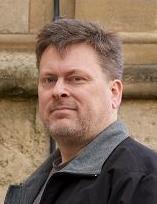Saturday, May 23, 2015
This Site Has Moved
I am now writing at www.thomasmcothran.com. Some of the content from this site has already been migrated there, and the rest will (hopefully) follow in short order. Update your bookmarks.
Friday, May 22, 2015
The Restoration of Some Things
Edward Feser's reply to Hart's most recent essay has surfaced in The Public Discourse. Feser does attempt to defend himself from the charge that his eschatology differs widely from what the Scriptures teach, and he ends up resorting to some remarkable exegetical maneuvers:
I agree with the premise that all of creation will be redeemed. But it simply doesn’t follow that there will be animals in Heaven. To make such an inference would be, among other things, a fallacy of division. (If your stylist assures you that you are not losing your hair, it doesn’t follow that you won’t lose a single strand.) For all Hart has shown, that all of creation will be redeemed entails only that something of the corporeal and animal worlds will exist in Heaven. That our bodies will be restored to us in the resurrection suffices to guarantee that much.
On Feser's view, so long as all finite reality in existence at the time when God is "all in all" is redeemed, all of creation will be (technically) redeemed. There need be no strong similarity between what is in our world and what will be in the eschaton.
Of course, on this view "all of creation" would be redeemed if in age to come all that exists is a (redeemed) heap of coffee grounds, a tapeworm, and the members of AC/DC. Technically, Angus Young alone would do it.
Monday, May 18, 2015
A New Earth: David Bentley Hart responds to Edward Feser
David Bentley Hart's essay (much of it tongue in cheek) declaring that animals may experience heaven met with a characteristically humorless and extravagantly verbose series of responses from Edward Feser. (1, 2, 3)
Hart has responded in his "Back Page" feature in First Things. The article, "Romans 8:19-22" is behind a paywall, but here are a few choice excerpts:
Of the few things I can say about Edward Feser with any confidence, perhaps the most obvious are that he is an adherent of The [Thomist] System, that he is one of its more uncompromising advocates in popular Christian apologetics, and that he is valiant (if not always subtle) in attacking any deviation from the vision of reality it promotes. To this, I can subjoin the observation that, like many guardians of The System, he exhibits a severely limited knowledge of the larger Christian intellectual tradition, and so does not always recognize it when it comes into conflict with certain of The System's principles....Thomas M. Cothran is now blogging at www.thomasmcothran.com. The rest of this article may be viewed at www.thomasmcothran.com/hart-feser-animals-heaven/.
Saturday, May 16, 2015
Being, Beings and God: A Few Thoughts on an Ongoing Debate

It's an interesting debate for a number of reasons. It involves some of the most fundamental issues in metaphysics and theology. The debate is timely, because it is often said that the new atheist movement falsely supposes that God is a being among beings. It is striking to see someone on the theistic side of the fence defend a flat sort of ontology against the radical ontological distinctions that have been traditionally drawn.
I won't summarize the debate. Interested readers should just read through it chronologically. But perhaps a few comments on Tuggy's most recent response are in order.
Wednesday, February 11, 2015
How Should We Speak of God? A Response to Daniel Linford
My new article, "How Should We Speak of God? A Response to Daniel Linford" has been posted at Strange Notions. Here is an excerpt:
Last December, an article by Daniel Linford entitled "Do Atheists Reject the Wrong Kind of God? Not Likely" appeared at Scientia Salon. Certain recent "popular books,” according to Linford, have advanced a "mystical" notion of God, arguing that contemporary atheists have directed their disbelief only toward "smaller" conceptions of the divine. Three contemporaries are singled out: Karen Armstrong, John Haught, and David Bentley Hart.
On what Linford denominates the "mystical" view, God is radically transcendent, not a being within the cosmic order, and cannot be circumscribed by human language. Many of the atheist assaults are directed against a God who is, more or less, a being among beings, and a person much like us. Linford believes that sophisticated thinkers have sought to outflank such arguments by moving to higher ground, positing a God who escapes our language and ways of thought.
Sunday, February 1, 2015
A Webb of Confusion
Stephen Webb's recent article, "The End of the Analogy of Being," follows a now familiar pattern. Webb sets forth a characterization of some thinker that bears almost no resemblance to what that thinker said, and, on consulting that thinker's works, I usually find him to be saying the exact opposite. Webb is hardly ever clear, when he attributes a belief to someone, if that belief is explicitly held or a consequence (welcome or otherwise) of that thinker's views. And, if the latter, Webb never says what the specific propositions are that lead to the portrait Webb paints.
Subscribe to:
Comments (Atom)
